
Washington State is the oil refining capital of the Northwest, and has the fifth highest refining capacity of any state in the nation. Unfortunately, it is also the site of two deadly industrial accidents killing thirteen workers in total.
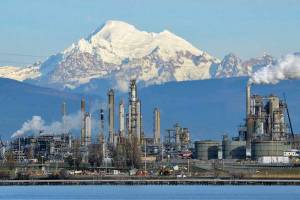 Five refineries currently operate in Washington State, with a joint capacity of 631,700 barrels per day. While refineries are an important source of jobs and economic growth, they also have the potential to expose workers and surrounding communities to highly hazardous chemicals, fires, and explosions related to loss of containment and combustion.
Five refineries currently operate in Washington State, with a joint capacity of 631,700 barrels per day. While refineries are an important source of jobs and economic growth, they also have the potential to expose workers and surrounding communities to highly hazardous chemicals, fires, and explosions related to loss of containment and combustion.
To ensure a safe and healthy workplace among industries that deal with highly hazardous chemicals, including oil refineries, the Occupational Health and Safety Administration (OSHA) issued the Process Safety Management (PSM) of highly hazardous chemicals standard (OSHA 3132) in 1992.
The OSHA PSM Standard has been in effect for over 25 years, and despite the notable improvements that have been made to refineries during this time, significant gaps in the standard allow refinery incidents to continue to plague the industry. The U.S. Chemical Safety Board reports there were 125 major PSM incidents in 2012 alone, and incident investigations reveal chronic problems where symptoms are fixed again and again without effectively addressing root causes.
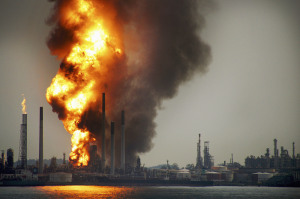
In an effort to close the gaps, California recently passed a revised state-wide PSM standard for oil refineries, following a four and half year campaign by a broad coalition led by the United Steelworkers Union, and the Blue-Green Alliance. The revision is based largely on the recommendations of the industry's Center for Chemical Process Safety (CCPS) Guidelines for Risk Based Process Safety. Following the implementation of California's new standard, the Washington State Department of Labor and Industries' Division of Occupational Health and Safety (DOSH) has organized a PSM advisory committee, tasked with providing recommendations for revising the current PSM standard for oil refineries in Washington State.
Over the summer of 2018 two interns with the Occupational Health Internship Program (OHIP) worked to raise the bar for PSM in Washington State by assisting United Steelworkers Local 12-591 to document safety gaps in the current PSM standard, and to engage stakeholders about the new proposed Process Safety Management standard in Washington State.
The Occupational Health Internship Program (OHIP) is a national summer internship dedicated to helping students learn about the field of
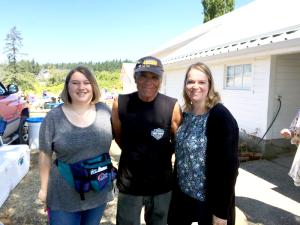
George Welch
occupational safety and health (OSH) from those most at stake: working people. OHIP plays a crucial role in training, mentoring, and inspiring a new generation of OSH professionals, while simultaneously providing worker organizations and unions resources to strengthen their health and safety efforts. With funding from the University of Washington's Northwest Center for Occupational Health and Safety Professional Training Opportunities Program, Sheena and Mary were able to base their work out of the UW Department of Environmental and Occupational Health Sciences, where they had access to professionals and researchers with expertise in PSM and occupational health and safety.
Under the supervision of Nancy Simcox, Director of Continuing Education Programs in the UW Department of Environmental Occupational Health Sciences, and Occupational Health Consultant Gail Bateson, Sheena and Mary conducted interviews and focus groups with key informants and stakeholders, to gather qualitative data and narrative stories to be used by the union to educate and increase engagement among members and the community for passing a new PSM standard for Washington State.
Through interviews with experts from the Center for Chemical Process Safety, union members and leaders, Washington State Department of Labor and Industries DOSH staff, and Chemical Safety Board investigators, Sheena and Mary found that constant changes in management, refinery maintenance and mechanical integrity of refinery equipment - some of which is 50-60 years old, and lack of employee collaboration and engagement with safety standards were among the top concerns expressed by interviewees. These findings guided their search for qualitative data and narrative stories that would resonate most with key stakeholders, union members, and the community.
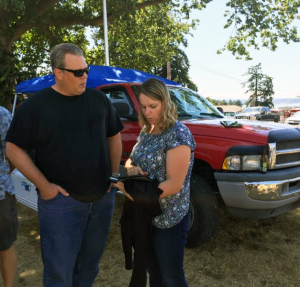
“Without active [employee] participation we’re right back to where we are now" says one interviewee, "Nobody knows how these facilities run better than operators out in the field today. We need to ask them what they think. If an operator has a problem, 9 times out of 10 they’ve already thought of a solution.”
“Employee collaboration is very important because what it tells me, is that process safety shouldn’t be an “us or them” thing," says another,
"collaboration in my mind means a partnership. And we can partner with the industry to keep our people safe. I really want to see our employees get more involved.” During the interview and survey process, Sheena and Mary found that while most employees they spoke to are familiar with the concept of Process Safety Management, most were not aware of the proposed new standard for Washington State. These results highlighted the importance of engaging the workforce in the campaign for a revised standard. "We wanted to support the union efforts to pass a stronger PSM standard by collecting and documenting testimony on near misses, gaps, or other potential safety breaches that could support the need to revise the current standard" says Sheena, "The information collected could also be used in the development of training for refinery workers, and increase worker awareness and engagement in discussions around PSM."
Upon the conclusion of their research and information gathering, Sheena and Mary produced several "give-backs" for the local union in the form
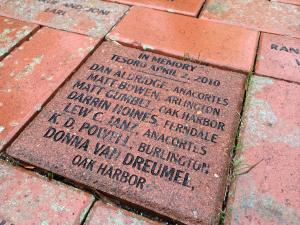
commemorated outside city hall in Everett, Washington.
of a media package to engage their membership and the community on the issue of PSM. The media package features several tools including a well researched interactive timeline of refinery incidents in Washington State, recommendations for updates to the union's website on refinery incidents and PSM, a brief video encouraging PSM engagement and education, and a flyer to help raise awareness.
"The most meaningful part of this project for me was engaging workers in open discussions related to the need for stronger process safety regulations" says Sheena, "Many local union members have witnessed tragic events stemming from gaps in process safety management systems. I have learned that active participation and collaboration at all levels is needed to ensure the effectiveness of safety programs in any workplace."
Watch the video created by Sheena and Mary as part of the media package for the United Steelworkers Local 12-591:
To learn more about the Washington State Department of Labor and Industries DOSH proposed standard please visit:




